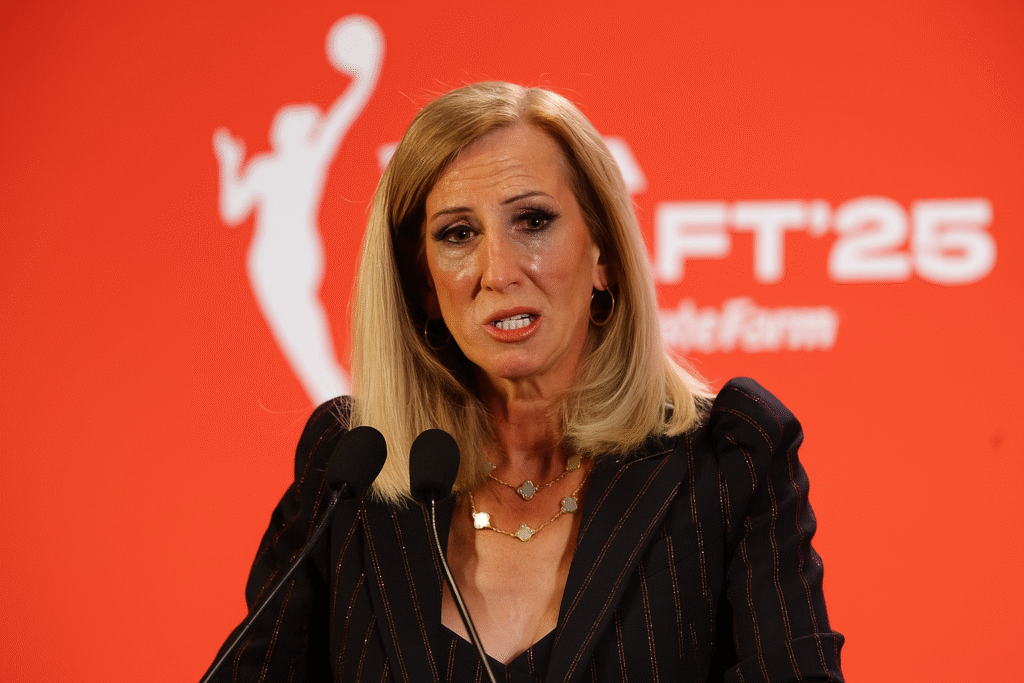By Harshit | October 4, 2025 | Las Vegas | 1:30 EDT
LAS VEGAS — Cathy Engelbert can tap dance all she wants until the WNBA Finals are over, but the damage is already done. The commissioner’s non-denial denials and pleas for sympathy did little to reassure players that she can act as an honest broker in the ongoing collective bargaining negotiations. What trust remained after the All-Star Game bargaining session evaporated earlier this week when Napheesa Collier exposed what she sees as Engelbert’s lack of respect for the league’s players. Engelbert’s refusal — or inability — to counter those claims in a press conference ahead of Game 1 of the WNBA Finals on Friday only amplified tensions.
The controversy erupted when Collier shared that Engelbert allegedly told Caitlin Clark she should be grateful for the platform the WNBA provides, implying her success depends solely on the league. Engelbert’s defensive response was vague. Asked about her alleged comment that players should be “on their knees, thanking their lucky stars” for a $2 billion media rights deal, Engelbert did not directly deny the statement. Instead, she cited “inaccuracy” without clarifying specifics, then pivoted to discuss criticism directed at her and her family.
“I’m a human, too,” Engelbert said. “I have a family. I have two kids who are devastated by these comments.”
For players, the most devastating aspect isn’t the public defense but the underlying perception that their commissioner does not genuinely advocate for their financial and professional interests. ESPN analyst Chiney Ogwumike underscored the issue, noting, “These women are smart. They’ve done the numbers, they’ve run the numbers … and everyone is playing their role to avoid a lockout and keep this product on the floor. But it now feels like it’s been wasted time. And that’s on Cathy, unfortunately.”
The negotiations over the next collective bargaining agreement were always expected to be tense. Interest in women’s sports, and the WNBA in particular, has surged over the last five years. Revenue is growing, media deals are expanding, and expansion franchises are commanding hundreds of millions of dollars. The new $200 million per year media rights deal will inject unprecedented funds into the league. Players seek significant raises in salaries — currently topping out at $250,000 — and improved revenue sharing, still only around 10%, far below the roughly 50% typical in major men’s leagues.
Engelbert insists she understands and supports these demands. But her actions, and her inability to directly address Collier’s claims, cast doubt on that assertion. The WNBA’s negotiating sessions have become a source of frustration for players. Forty players attended the All-Star Game bargaining meeting, demonstrating their commitment, only to leave feeling that little progress had been made. Breanna Stewart, union vice president and New York Liberty forward, said at the time, “Not many things did we both agree on. I think there were two bullet points where we were like, ‘OK, we can move forward with this.’”
Now, with the CBA set to expire on October 31, Engelbert’s timing has compounded concerns. By postponing direct dialogue with Collier and other union leaders until after the Finals, she has inadvertently signaled a lack of urgency. Players see this delay as a tone-deaf approach that undercuts trust and may even threaten labor stability.
“I feel confident that we can repair any loss of trust,” Engelbert said during her press conference. “I think together we need to move forward.”
For many players, that confidence is untenable. They question whether Engelbert prioritizes their interests or seeks to protect herself and appease league owners. Collier’s critique has galvanized the player cohort, including stars like Clark and four-time MVP A’ja Wilson, who have publicly supported her. The consensus is clear: the commissioner’s credibility is under scrutiny, and until she demonstrates accountability, meaningful negotiations will remain stalled.
The WNBA stands at a critical juncture. With the Finals underway, the collective bargaining process continues in the background, but the stakes extend beyond wins and losses. Players demand respect, transparency, and equitable compensation — a challenge that will test Engelbert’s leadership in the months ahead. For now, the biggest obstacle to a smooth negotiation isn’t the media deal or expansion costs — it’s the commissioner herself.

